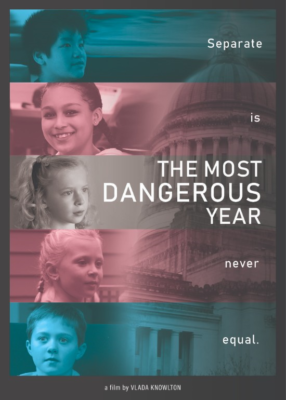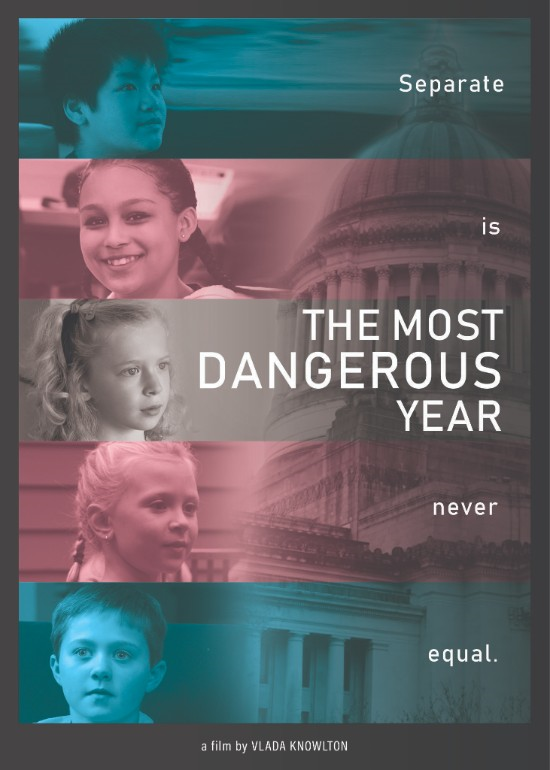Faced with the challenge of making a film on a topic that was so personal to her family, Vlada Knowlton knew that she had no choice but to push through.

Director: Vlada Knowlton
Release Year: 2018
Running time: 90 minutes
Watch trailer
“There are personal topics that are simply inspirational and then there are personal topics that are also matters of life and death. And this one, unfortunately, more closely fit the latter category.”
“The Most Dangerous Year”, premiering at SIFF 2018 next week, gets its title from a report issued by the Human Rights Campaign that warned that 2016 was going to be the most dangerous year for transgender Americans.
The film chronicles the fight in Washington over so-called “bathroom bills” through the stories of a number of families, including Knowlton’s, with a transgender child.
Knowlton and her husband have two daughters and one son. Their youngest daughter was born with a body typically associated with being male, and thus they were raising her as a boy. But at age three, she started to tell her parents that she was a girl. When she was being socialized and treated as a boy, their daughter was unhappy and struggling, but once they accepted what she was telling them, that she was a girl, and started treating her as a girl, she blossomed.
In 2016, their transgender daughter was a spunky, confident, five year old.
But the specter of coming fight for her most basic rights was a concern for the whole family, as well as for the support system of other families with transgender children that the Knowltons were a part of.
So Knowlton set out to make this film to document their fight as well as to educate more people about what being transgender really means, which she believes will ultimately lead to greater support for the transgender community.
When asked if the deep personal nature of the topic for her family ultimately made it more challenging to make than film, she said that was definitely the case.
“I think this particular topic, one which held my own child’s life and future in the balance, made the process of making the film more challenging..”
“I think one of my top challenges here was to make sure that I didn’t allow a sense of despair or fear cloud my judgement when going through each stage of the filmmaking process. It was definitely an exercise in compartmentalization, the likes of which I’d never attempted before.”
Particularly tough, Knowlton said, was “having to interview or film people who don’t consider my daughter sane or who don’t think her core identity is real.”
In Washington State, and in cities and states across the country, bills were being proposed that prohibited people from using restrooms that match their gender identity, and instead requiring that all people use the restrooms based on their genitalia or the sex that they were assigned at birth.
Anti-discrimination laws in Washington State have allowed people that are transgender to use the bathroom, washroom, or restroom that matches their identity since 2006, but as militant right wing radicals across the country rallied around the cause of enforcing their patriarchal values system on everyone else, several groups in Washington began clamoring for legislation here.
First, six different bills were initially proposed in the state Legislature, with one, Senate Bill 6443 having public committee hearings and making it all the way to the Senate floor for a full vote after it was passed by the Republican-led committee.
Families featured in the film testified at the hearings and participated in rallies in front of the Capitol Building in Olympia.
Thankfully the bill lost by just one vote, as a few Republicans split with the rest of their party and voted against taking basic rights away from transgender individuals.
Unfortunately, the fight was not over, as a right wing organization in Washington that had led the fight against domestic partnerships in 2009 and against the state’s marriage equality law in 2012 created a group with the misleading name “Just Want Privacy” with the goal of collecting enough signatures to get a partial repeal of the state’s anti-discrimination rules on the ballot.
The Knowltons and their support group of parents made a plan increase their activism in order to ensure initiative effort would not be able to get the required number of signatures. While most of the families were normally pretty private and not wanting to draw attention to the fact that the had a transgender child, they all agreed they had to become more public in order to reach and educate more people, so that people would realize “our kids are just kids” and that there was no reason to fear transgender people using bathrooms that fit their gender identity.
The Washington Won’t Discriminate campaign kicked off in April of 2016 to counter Just Want Privacy’s signature collection efforts.
The coalition consisted of over five-hundred businesses, labor unions, non-profits and political organizations, including Equal Rights Washington, Legal Voice, Moms Rising, and the Gender Justice League, as well as NPI’s Permanent Defense project.
Other important supporters of transgender rights featured in the film are Aiden Key, a transgender man who is the founder and leader of the support group for parents of transgender kids that the Knowltons participate in, and Washington State Lieutenant Governor Cyrus Habib.
Habib powerfully addresses the specious main argument of those who advocate for so-called “bathroom bills” by claiming women and children will be at risk of some kind of victimization or assault.
“Let’s be clear: there is no documented evidence that people who are transgender are any more likely to be predators than the general population,” Habib says. “There’s no reason to believe that individuals using the bathroom that fits their gender identity leads to any of these sorts of acts.”
Habib then points out the political motivations for these empty arguments. “I understand that there are people out there who are being told that allowing transgender individuals to use the correct bathroom will lead to danger for themselves, or even worse, their children, and that can be a very powerful threat or a very powerful way to instill fear in people…”
“It’s an attempt to broaden the appeal of this socially conservative measures, by getting people to see a bogeyman where there simply isn’t one.”
That analysis matches the data from the two hundred and twenty-five cities across the country that have transgender anti-discrimination laws, as there is zero evidence of an increase in crimes or complaints.
Thankfully, Just Want Privacy was unable to collect enough signatures to get their discriminatory bill on the ballot in 2016. They tried again in 2017, and also failed. At the time “The Most Dangerous Year” was completed, it was believed that Just Want Privacy would try again in 2018, but no such effort has materialized. The group appears to have given up on qualifying an initiative to the statewide ballot for now.
I asked Knowlton if this made her feel like at least the issue of public bathroom use is now fairly safe in Washington State. She answered that she suspects the group is waiting to see the results of similar initiates in other parts of the country this year. She sites one that failed in Anchorage, Alaska in April, current signature-gathering efforts in Montana for an initiative to potentially go on the ballot, and a measure that will be voted on in Massachusetts in November asking voters if they want to repeal or preserve their current transgender anti-discrimination law.
“I don’t think we can say that transgender rights are truly safe in Washington until they are safe across the country,” Knowlton said.
“And that, of course, would also require a commitment to equality and civil rights at the federal level. So there’s still a lot of work to be done.”
“There are battles on several fronts right now,” she says.
“The federal government is making attempts to roll back non-discrimination protections for transgender people in healthcare. Obviously that would be devastating to trans people and their families.”
“The Trump administration has also recently rescinded protections for transgender prisoners. That is particularly dangerous for transgender women inmates who are exposed to an inordinately higher rate of rape and abuse. The Department of Education has indicated it won’t protect transgender students from discrimination in their public school districts. And I think we’ve all heard about the administration’s ongoing attempts to ban transgender soldiers from our military.”
“These are all malicious attacks against a minority population and these attacks rely on one thing and one thing only: the majority’s ignorance, ” Knowlton adds.
“Mainstream science and medicine have already established that transgender people are not mentally ill; that they are born transgender; that being transgender in and of itself is not any sort of pathology but is rather part of the natural diversity of the human race.”
The film features a number of medical experts explaining the science, including Dr. Kevin Hatfield of The Polyclinic in Seattle.
He explains that a person being transgender is not something anyone has control over, but that it is determined genetically, much like how we inherit eye color or are born with left- or right-hand dominance.
Knowlton feels that if more people were aware of these facts, it would go a long way toward ending discrimination. “I think that one of the most important things we as allies can do is educate ourselves and others on these types of facts. Education leads to understanding, which leads to justice.”
Reading Knowlton recommends for further information include:
- this guide for supporting and caring for trans kids put together by the Human Rights Campaign and the American Academy of Pediatrics;
- this analysis of previous research on supporting gender diverse children by the College of Family Physicians of Canada;
- this literature review from Cornell University on the importance of transitioning for mental wellbeing;
- and, for those who don’t a mind denser, scientific journal article, this article explains how the genitals and the gender of the brain are formed at different stages of fetal development.
Explains Knowlton: “Those two systems are independent of each other and it has been established that a fetus that develops a male reproductive tract can sometimes develop a brain with a female gender identity and vice versa. So this article both underscores the biological underpinnings of being born transgender or cisgender and offers some hypotheses of how this might happen.”
The National Center for Transgender Equality is also a great resource for information and for starting to take action. You can sign up for their email list, check out their Action Centers with detailed info on specific issues like health care and schools, or make a donation to support their work.
“The Most Dangerous Year” is also great first step towards educating yourself on transgender rights and what is happening locally in Washington State.
If you are in the Seattle area, I highly recommend getting tickets to one of the SIFF showings. After SIFF the film will be going to other festivals, so like and follow the Facebook page to find out where it will be going next and get details of future screenings as they are scheduled.

